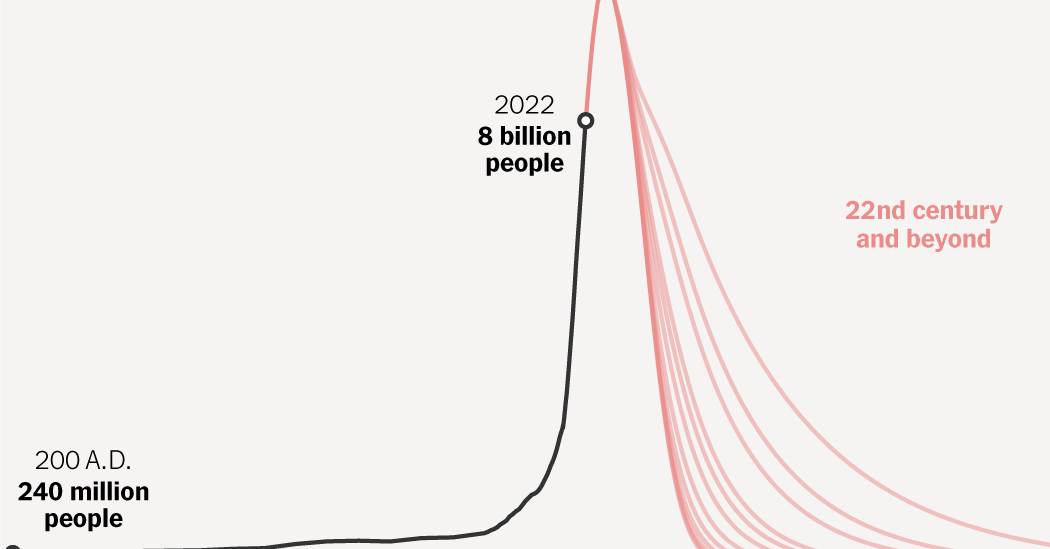Worldwide climatological disaster and associated geopolitical turmoil cause the human population to plummet rapidly. How rapidly will determine whether or not we return to essentially the stone age or maintain some semblance of modern civilization.
Some cross-disciplinary work by climate scientists, ethnographers, and economists who have more holistically examined economic collapses, have tentatively posited that the latter half of this century (2040 to 2080) could see a 40% to 90% collapse in the human population due to chaotic weather and lethally high wet bulb temperatures shrinking agriculture at scale to next to nothing.
Considering that we are accelerating past +1.5℃ of warming, and are still solidly on the “business as usual” path that is increasingly likely to lead to +4℃ of warming before the end of the century, combined with historical evidence that +4℃ warming will likely cause the extinction of most any megafauna over 50kg, and yes. We will likely see a rapid and unrecoverable plummet.
Could you please explain one thing to me: How does climate change cause the current population decline?
Chaotic weather.
80+% of agriculture depends on rainfall, either directly or in very near-indirect ways. A warmer atmosphere means not only air that dries out soils a lot faster and rains a lot less, but also more chaotic weather, with stronger deluges and more powerful droughts.
Agriculture at scale depends vitally on stable, consistent weather.
That stability and consistency is not in our future. Expect the first multi-crop, multi-year, worldwide famines to hit at some point in the 2030s. Expect the shortfall to be so so severe that it hurts even first-world populations. Anyone else will be much worse off.
But this can be the causal root of the recent changes. Populations aren’t declining because of famine, but because people aren’t having more children.
Your argument need some middle step or mediator like “people already realizing the comming problems and react with getting less childeren”. But is this really the case? I mean, we observe the decline even in places like north korea or by groups who denied clima change or simply don’t care.
Maybe, the emerging problems of clima change are part of the creation of a pessimistic worldview or something.
They’ve been saying that for 100 years now and it hasn’t happened yet. Humanity has always been able to adapt to changing circumstances.
It is way scarier when the old people are the majority of the population
A couple more covid-level events will take care of that.
Is it?
I’d be much more concerned if the world population skewed young and we were still projecting mass population decline within their lifetimes.
You need to see the big picture
He or she doesn’t want it.
Its a very, very uncomfortable truth. The older generations needs the workforce of younger generations in order to get things like good, medical help and other things. This work will not getting lower about decades.
We’ll have far more infra and a far lower population. For a couple of decades it would be somewhat nice. If capitalism does not take everything down with it.
We’ll have far more infra and a far lower population.
Nope. We will have a lot of older people who need the help of younger people in order to get things like medical aid, food and so on. And we will have lesser and lesser young people to provide these goods. To make matters worse, the younger generation has to deal with issues like maintaining infrastructure, building new technologies, and fighting the unwelcome effects of climate crises.
In a word: If utopia has a chance to happen, it will make us wait for almost 2 decades. No guarantee that utopia will ever happen. History knows not one example of population declaine without a collaps. Captialism isn’t the issue here.
sorry, I had intended to put this comment under my existing comment, which was about the culling of the elderly via periodic pandemics.
What Happens Next?
Nothing insurmountable, but a population with a comprised largely of elderly people will present some challenges.
Anything that far out is in a post-Singularity future where all bets are off. Real, self-improving AGI will completely change pretty much everything. It’s hard to be too worried about a problem with human choices in the 22nd century when the entire incentive structure of our economy will, by necessity, completely change someone in the intervening years.
I’m hopeful for the post-Singularity world. 2100 may be closer to Star Trek’s economy than ours today (ignoring the space stuff, of course). I’m not going to hold my breath on this issue. There are many reasons to expect it to fundamentally change before then.
In the interest of balance, an ai singularity is far far far from a foregone conclusion, in fact has significant theoretical issues that are largely handwaved away by people wanting you to be scared of singularity or to buy into their ai grift.
Sure, but in this context I was mostly thinking about how the Singularity will make significant numbers of hours of work optional for most people. UBI might get us there even sooner. We have enough wealth creation already to support reduced work, if we restructure our economy.
Parenting choices look a lot different when families don’t need two people employed to stay afloat.
Productivity gains already haven’t done that. Even if a generalized technological singularity, again, a dubious and entirely baseless claim, there’s no guarantee that it actually achieve any of what you’re describing.
Work to make it happen, don’t bet your future on it.
IMHO, a UBI is just an option in the case that all production is made by machines. If a sector of people is still forced to work, they will not accapt it.
Services like nurses or that like may be something other…
Nuclear war
Why? Reduced headcount = reduced stress on resources. The key is acknowledging specifically where the population has capped, and meeting the needs of those where it hasn’t. Also increasing the availability of immigration to smooth these spikes and transitions.
(I am not advocating eugenics or classical overpopulation myths. Only recognizing that if we were in a situation where population was going to say, double, we would have different concerns in 100 years.)
Nah it’s a joke of nuclear war happening, causing the massive drop in population growth
They said what happens NEXT so in the headline, the population caps, THEN the NEXT happens.
Yeah, I misunderstood “next” as in next from now, instead of next after the peak




